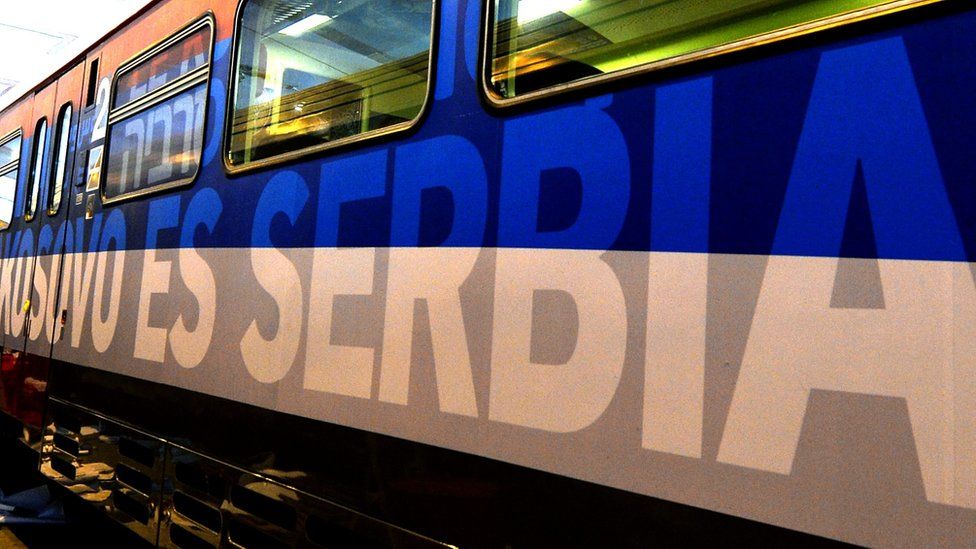Train row almost pulls Kosovo and Serbia off the rails
- Published

The new train service could have been a celebration of warming relations between Serbia and Kosovo. But instead, in the words of Serbia's president, Tomislav Nikolic, it brought them to "the brink of conflict".
This was not just any rail journey. It would have been the first direct train in almost two decades between Serbia's capital, Belgrade, and North Mitrovica, a town in northern Kosovo with a large ethnic-Serb population.
"[Ethnic] Albanians showed they want war," said Mr Nikolic. For his part, Kosovo's president, Hashim Thaci, accused Serbia of "provoking" Kosovo's ethnic-Albanian majority, in an attempt to replicate what he called "the Crimea model" by taking control of northern Kosovo.
Instead of promoting freedom of movement, the North Mitrovica train affair is threatening to derail an EU-mediated process that has seen the two sides reach agreements on everything from judicial structures to, last month, a long-awaited international telephone dialling code for Kosovo.
But the Serbian authorities chose to mark the train's launch with a special livery. Inside, paintings of Orthodox saints; outside, the slogan "Kosovo is Serbia" in 21 different languages.
The authorities in Pristina duly took the bait and sent police to prevent the service entering Kosovo. The train stopped well before it got there, but it had gone far enough to allow politicians on both sides to voice their outrage.
On many levels, this is a concocted controversy. Belgrade and North Mitrovica have long had direct transport links through several daily bus services. In fact, they make the journey in around half the time of the proposed train timetable.
And it is no secret that "Kosovo is Serbia" is Serbian government policy. It is supported in this assertion not just by Russia, as is usually mentioned in media reports, but a diverse array of more than 80 UN member states, including Spain, Brazil, India and Nigeria.
All of them refuse to recognise the unilateral declaration of independence which Kosovo made in 2008.
Tensions escalated earlier this month when former Kosovo Prime Minister Ramush Haradinaj was arrested on a Serbian war crimes warrant. He was eventually released but Kosovo saw his detention as a diplomatic provocation.
Cynics might suggest that the timing of this kerfuffle could be connected to the Serbian presidential election in April, in which Mr Nikolic will face a challenge from unapologetic ultra-nationalist, Vojislav Seselj.
There may also be an element of Belgrade highlighting its complaint that Pristina is not doing enough to implement its side of the 2013 Brussels Agreement aimed at normalising relations.
In Kosovo, the shenanigans could be viewed as a welcome distraction for political leaders who fear they may become embroiled in a new war crimes tribunal, which aims to prosecute alleged atrocities by the Kosovo Liberation Army in the late 1990s.
The US has unsurprisingly taken Kosovo's side and Russia, equally predictably, supports Serbia.
The EU has simply urged Belgrade and Pristina to keep talking. And Serbian Prime Minister Aleksandar Vucic has said he wants to set up a hotline to his Kosovo counterparts and steer relations to calmer waters.
As Serbia's EU membership negotiations depend on this, perhaps normal service will soon be resumed, even if that does not apply to the North Mitrovica line.
- Published15 January 2017
- Published12 January 2017
- Published28 June 2023